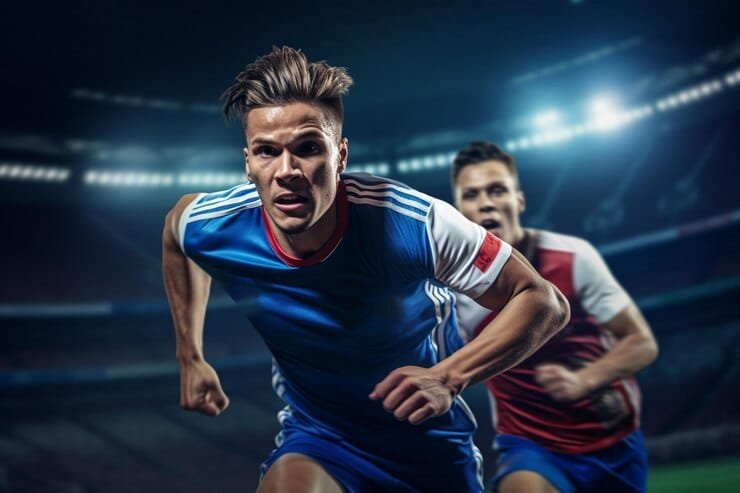In the world of professional sports, athletes aim for the top of their leagues. This includes the NFL, MLB, NBA, and more. Success comes from a mix of physical, mental, and logistical factors. Knowing these can help athletes excel in professional sports.
Key Takeaways
- Being physically fit and having the right body type is key in sports.
- Psychological traits like motivation and handling pressure are vital for success.
- Good team dynamics, like clear roles and communication, help teams win.
- Practicing regularly, getting good coaching, and mastering sport skills are crucial.
- Dealing with job security, money issues, and contract uncertainty is part of the job.
Fitness and Physical Factors for Success
In professional sports, being fit is key to doing well. Body composition, aerobic endurance, muscle strength, and explosive power are all important. They work together to help athletes perform at their best.
Body Composition
How an athlete’s body is made up of muscle and fat affects their performance. Having the right mix of muscle and fat helps them move better and be stronger. This makes them more powerful for their sport.
Aerobic Endurance
Aerobic endurance means being able to keep going during long, hard workouts. It’s key for sports like running, biking, or playing soccer. This fitness helps athletes stay strong over a long time.
Muscle Strength and Power
Muscle strength lets athletes do work against resistance. Explosive power is about using force quickly, like in jumping or throwing. These are important for fast, powerful sports like weightlifting or sprinting.
Speed and Quickness
Speed and quickness are about moving fast or moving parts of the body quickly. These are key for sports like soccer, basketball, or tennis. They help athletes change direction quickly.
Other important factors include flexibility, agility, balance, coordination, and reaction time. These help athletes perform better and succeed in sports.
Mental and Psychological Factors

In professional sports, the mind plays a huge part in winning. Motivation and self-confidence are key. Athletes with these traits believe in themselves deeply, pushing their performance up.
Handling pressure is also crucial. Top athletes stay calm and focused under high stress. Their analytic and tactical ability helps them make smart moves in tough situations.
Motivation and Self-Confidence
Motivation and self-confidence work together in sports. Athletes driven by love for the game and a wish to be the best show confidence. This mix of motivation and belief sets many successful athletes apart.
Coping with Pressure
Performing well under pressure is key for athletes. The best players stay focused and calm, even when the game is on the line. They use strategies to handle stress, letting them shine when it counts.
Analytic and Tactical Ability
The mental game is as big as the physical one in sports. Athletes with strong analytic and tactical abilities can quickly read and react to game changes. They make quick decisions that can change the game’s outcome. This mental game is a big part of sports psychology that sets the top athletes apart.
Professional Sports and Team Dynamics

In professional sports, how a team works together is key to winning. It’s not just about the talent of each player. Role clarity, good communication, and strong interpersonal relationships are vital for success.
Role Clarity and Communication
It’s crucial to have clear roles in a team for team cohesion and team performance. When everyone knows what they’re supposed to do, it creates a sense of purpose. Good communication is also key. It lets team members share ideas, give feedback, and work together smoothly.
Interpersonal Relationships
Teams in professional sports are like a tight-knit community. The bonds between team members greatly affect the team’s dynamics. Positive relationships make everyone feel like they belong. This boosts team morale and creates a collaborative environment.
Minimizing Social Loafers
Dealing with social loafers is a challenge in sports teams. These are people who don’t fully contribute because they’re not motivated or feel they have no chance to shine. It’s important to keep these people from dragging down the team. Creating a culture of accountability and making sure everyone has a fair shot can help reduce social loafing and improve team dynamics.
“The strength of the team is each individual member. The strength of each member is the team.”
– Phil Jackson, former NBA head coach
Developing Skills and Techniques
Improving in professional sports takes three main things: good instruction, practice, and repetition. Athletes and coaches often hope for quick changes, but it’s tough to change old habits. It takes a lot of repetition to make new techniques stick.
Even with great technique, athletes need to trust their skills. They must also have a performance mindset to use what they’ve learned in games. Overcoming fears and pressure is key to letting skills shine in games.
Good Instruction
Quality instruction is key for improving skills and techniques in sports. Coaches with experience give clear feedback and help athletes get better. They help with form, mechanics, and new skills.
Practice and Repetition
Good instruction sets the stage, but practice and repetition make skills stick. Regular, focused practice helps athletes remember new moves. This lets them perform well under pressure.
“It’s not about the hours you put in, it’s about the work you put into those hours.”
With a performance mindset and lots of practice and repetition, athletes can boost their skills and techniques. This puts them on the path to lasting success in their sport.
Trusting Your Abilities
In professional sports, trusting your skills is key to success. Athletes with great training and practice may struggle if they doubt their talent and readiness. Fears of failure, wanting to be perfect, and high goals can stop them from performing well.
Having a performance mindset helps athletes perform consistently in competitions. By trusting their hard work and playing without worry, athletes can beat these mental blocks. This trust in their skills is vital for doing well in sports, letting them perform well under pressure.
“The key to success in professional sports is not just about physical fitness and technical skills, but also the ability to trust in your abilities and perform with a confident and focused mindset.” – Sports Psychologist, Dr. Emily Johnson
It’s important for athletes to get past mental barriers and focus on performing well. By believing in their skills and playing confidently, they can reach their full potential and excel in their sports.
Challenges in Professional Sports

Professional sports teams and athletes today face big challenges that threaten their future success. Many talented rugby union players are now looking for new jobs after their teams folded. This has made getting a spot on a team even harder. Now, contracts are shorter, making job security a big worry.
The COVID-19 pandemic has also hit the finances of professional sports teams hard. With no money coming in from games, teams are finding new ways to make money. They need to make changes to the professional sports business model to stay afloat. Overcoming these financial sustainability and contract uncertainty issues is key for professional sports to keep going american professional united states and canada major league soccer american football sports leagues in the united league in the united states.
Job Security and Contract Uncertainty
- Shorter contracts mean more worry about job security.
- More competition for spots on teams after some teams folded.
- Great players now have to look for new teams.
Financial Sustainability of Teams
| Revenue Source | Impact of COVID-19 Pandemic |
|---|---|
| Live event ticket sales | Significant decline due to event cancellations and reduced attendance |
| Broadcast rights and sponsorships | Pressure on teams to renegotiate contracts and find new revenue streams |
| Merchandise and concessions | Reduced sales due to fewer in-person attendees |
Professional sports teams are facing big financial challenges. They need to cut costs and find new ways to make money to stay afloat. These sports industry challenges make financial sustainability hard to achieve highest average olympic games united football league sporting event american hockey league english premier league world series ice hockey see also professional baseball world cup canadian football league.
“The current professional sports business model is unsustainable, and teams must adapt to the changing landscape to remain viable in the long run.”
Also Read : What Are The Best Team Coaching Tips For Team Sports?
Conclusion
Success in professional sports needs a mix of many things. It’s about getting fit, improving skills, and building strong mental and team skills. Each part is key to reaching the top in sports.
The key factors for success are physical fitness, mental strength, team work, and always getting better at skills. Keeping fit, improving tactics, and building strong team bonds all help athletes and teams do well.
As professional sports change, knowing these key factors and being good at them is crucial. A full approach to training and always trying to get better is vital. This way, sports pros can reach their best and get the takeaways that make them great.
FAQs
Q: What are the key factors to success in professional sports leagues?
A: Success in professional sports leagues typically hinges on a combination of talent, teamwork, strategy, and the ability to perform under pressure. Additionally, factors such as coaching, player fitness, and mental resilience play crucial roles in achieving success.
Q: How do player salaries influence success in major leagues?
A: Player salaries in major leagues often reflect the talent and experience of athletes. Higher salaries can attract top talent, which may enhance a team’s performance. However, a successful team also requires effective management and chemistry among players, not just high salaries.
Q: What role does coaching play in the success of a professional team sport?
A: Coaching is a vital factor in professional team sports. A good coach develops strategies, motivates players, and adapts to changing situations during games. Coaches in leagues such as the National Football League or the National Basketball Association significantly impact their teams’ performance and success.
Q: How important is teamwork in professional sports leagues?
A: Teamwork is essential in professional sports leagues, as success often depends on how well players collaborate and communicate on the field or ice. Cohesion among teammates can lead to better execution of plays and overall performance, especially in major sports leagues like the NHL or NBA.
Q: What are the differences in success factors between individual sports and team sports?
A: In individual sports, success primarily depends on personal skill, mental toughness, and self-discipline. In contrast, team sports require collaboration, communication, and shared strategies among players. Both types of sports, however, demand a high level of dedication and training.
Q: How do major leagues manage player development in their minor league systems?
A: Major leagues utilize minor league systems to develop emerging talent. These systems provide young players with the opportunity to gain experience and refine their skills in a competitive environment. Success in these minor leagues can lead to promotions to major leagues, such as Major League Baseball or the National Hockey League.
Q: What impact do external factors like media coverage have on professional sports success?
A: Media coverage plays a significant role in the success of professional sports leagues by increasing visibility and fan engagement. Effective sports media strategies can enhance a league’s marketability and attract sponsorships, which in turn supports team operations and player development.
Q: How does player fitness affect performance in leagues like the NFL or NBA?
A: Player fitness is crucial in leagues such as the NFL and NBA, where the physical demands of the sport are intense. Well-conditioned athletes can perform better, reduce the risk of injuries, and maintain peak performance throughout the regular season and playoffs.
Q: What are the challenges faced by expansion teams in major professional leagues?
A: Expansion teams in major professional leagues often face challenges such as building a competitive roster, establishing a fan base, and securing financial support. These teams usually take time to develop and may initially struggle to achieve the same level of success as established franchises.
